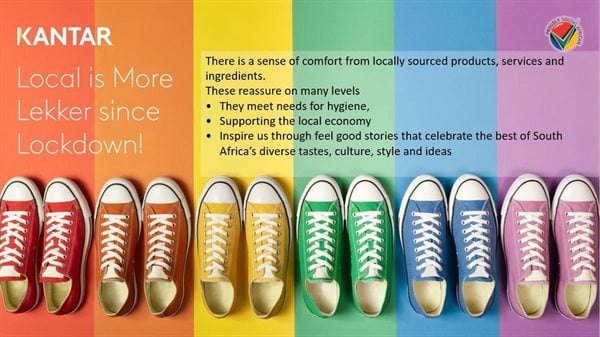
Top stories






More news


Marketing & Media
Ads are coming to AI. Does that really have to be such a bad thing?














Kantar’s Covid-19 Barometer has been exploring how people are feeling and acting around the world since the start of the pandemic. With over 150,000 people’s opinions in 60+ markets, the study helps marketers understand the short- and long-term implications for their brand, as well as the marketing levers they need to influence.
In addition to exploring evolving habits, behaviours and concerns as lockdown started to lift, the data explores six distinct consumer tribes defined by levels of worry, information consumption and adherence to rules. These insights help marketers meet people ‘where they’re at’ and speed up post-pandemic recovery by reshaping their messaging, consumer experiences and even innovation plans.
It’s important to look at this on a granular level because in South Africa, one of the biggest shifts has been that of buying locally produced products wherever possible, with more consumers paying attention to where the product was sourced or manufactured. We also avoided face-to-interactions as more South Africans embraced purchasing essentials online, as digital commerce pivoted to include WhatsApp and SMS ordering to reach consumers.
For many, 'staying safe’ initially meant baking banana bread while holed up at home. So, thinking out of the produce box is the best way to adapt to the Covid-19 challenge and often required true innovation, like meeting consumers’ latent demand for the buzz of alcohol when sales were halted, with clever DIY pineapple, sugar and yeast displays in-store.
The focus on health also resulted in an increased demand for products seen to boost strength and immunity, with lemons and ginger flying from the shelves. Despite initial resistance to ‘naked food’, our unconscious focus on practical ways to minimise waste and get products to last longer has secured sustainability’s place in the spotlight.

Now finally entering lockdown Level 1, consumers continue to adapt their everyday lives to fit in with the current situation, with 69% of South African households’ income already affected in some way – such as reduced hours or pay.
Past recessions have shown that unless value is created, consumers tend to downgrade to basic alternatives when wallets are tight. In our fragile economy, with consumers more price-sensitive and the market more competitive than ever before, the value equation has been reimagined.
For many consumers, perceived value is now about feeling you’ve spent wisely based on having your functional and emotional needs of trust, safety, quality, convenience, functional and emotional performance met.
Consumers ultimately have three choices, all difficult: Switch to a more affordable category or brand; swap to a more affordable size or pack format for greater value; or rationalise quantity and frequency of consumption to squeeze their overall consumption and stretch their budget.
While snacking initially increased due to the amount of time spent at home, many steered away from luxury buys like steak switching to affordable alternatives like mince, focusing on long-life staples to minimise waste and plan for the uncertainty of the future.
This means brands must try harder to reach their hearts and minds and increase brand equity in the long-term because to many, the long-term seems like blue-sky thinking. To restore confidence in the short-term, brands need to move consumers from that sense of fear and fragility to one of comfort and safety.
Champion this recovery by providing physical signals of safety in your packaging and showcase the origin of the product and supply chain safety processes where possible – such as with the Proudly South African brand mark.
Locally sourced products, services and ingredients comfort consumers, meeting their new needs for hygiene and spreading feel-good stories that celebrate the best of our diverse culture, style and ideas. So, demonstrate your brand’s innovation and drive penetration by taking your products to where the people are.
Take note of the new occasions being unlocked and learn what consumers are looking for. Also keep an eye out for new business models for delivery and partner with local distributors or cut costs by selling directly to the customer.
That may well mean driving all things digital while reviving bricks-and-mortar as best you can. Although online shopping has grown across many categories, ensuring positive customer experience is key to making new tech-enabled patterns stick. The resulting shift from physical cash to electronic forms of payment is also expected to continue.
Worries about small business survival coupled with concerns about contamination of imported goods mean we’ll continue to prefer to buy products with strong provenance. So, success at the tills in times like these is ultimately about understanding how best to offer value, underpinned by the mantra that local is more lekker than ever before. Own it by walking the talk and dialling up your ‘South African-ness’ in an authentic way.